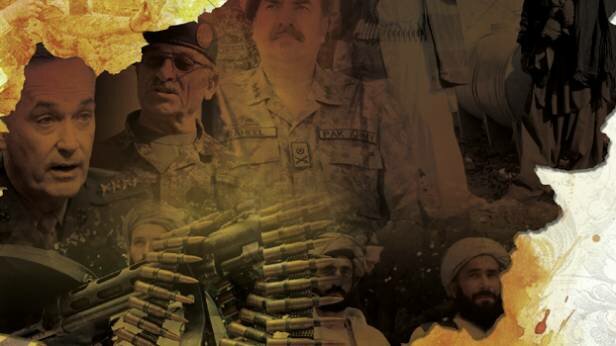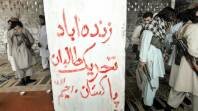Pakistan’s internal security is largely linked to stability and peace in Afghanistan. Apart from an intra-Afghan reconciliation that should include all ethnic and political factions, the Afghan Taliban and their affiliates’ behaviour after 2014 will determine the future of security in Afghanistan and the region.
It is highly unlikely that the Afghan Taliban can capture Kabul but their perceived role as a destabilising factor is more concerning for the world. Pakistan, nonetheless, is extremely concerned about the security of its border with Afghanistan and also the cross-border terrorist assault launched against Pakistan by the Pakistani Taliban sheltered in Afghanistan. Pakistan’s Chief of Army Staff General Raheel Sharif during his recent visit to Kabul shared Pakistan’s concerns with Afghan authorities regarding the alleged sanctuaries of Tehreek-i-Taliban Pakistan (TTP) in Afghanistan and said that Islamabad suspected that the TTP chief Mullah Fazlullah was given refuge by Afghan security agencies.
The COAS also discussed the border security issues with particular emphasis on enhancing the coordination arrangements along the Pak–Afghan border in a tripartite meeting with the Afghan Chief of General Staff General Sher Muhammad Karimi and ISAF Commander General Joseph Dunford.
No doubt, the Taliban–both Afghan and Pakistani–are a major irritant in bilateral relations between the two countries. But the Taliban are usually conceived in a narrow perspective of ‘proxies’. Afghanistan blames Pakistan that it is still using the Afghan Taliban as proxy agents and Pakistan believes that the TTP is increasingly becoming a strategic asset for the Afghan security establishment. This context writes off the option to see the Taliban as an indigenous force.
In Pakistan, the security establishment appears in a hurry to strike hard against the TTP before 2015 so that no one can use the banned group as a strategic tool against Pakistan—including the Afghan Taliban and Afghan security institutions.
At the same time, a feeling of uncertainty and unease is growing among Pakistani strategists regarding the Afghan Taliban’s likely behaviour after NATO troops’ withdrawal from Afghanistan. The major reason is that the Afghan Taliban and the Haqqani network have not used their influence among the TTP leadership and other militants on both sides of the border to convince them to stop launching attacks inside Pakistan. It is feared that after 2015, the Afghan Taliban will continue to use the TTP as a tactical tool against Pakistan to maintain what they view as a strategic balance.
It is likely that some Pakistanis believe that if the TTP is dismantled or weakened enough before 2015, the Afghan Taliban would not be able to use them as a bargaining lever and will continue to look towards Pakistan for political support.
However, a full-scale operation in North Waziristan cannot guarantee the TTP’s elimination. There are two reasons. First, the TTP and its local and international affiliates have expanded their networks in other parts of the country and the number of terrorist sleeper cells is increasing. Secondly, the North Waziristan militants can relocate to Afghanistan and join Mullah Fazlullah’s forces thus becoming more problematic for Pakistan. It will be a nightmare for the establishment if these militants become strategic assets in the hands of Afghan security agencies.
In this context, a prolonged US presence in Afghanistan could become a stabilizing factor in Pak-Afghan ties. The US has its own reasons for maintaining its presence in the region. Apart from the Al Qaeda presence, it is concerned about Pakistan’s nukes. Besides, its presence in Afghanistan will keep geostrategic pressure on Iran, China, Russia and the Central Asian states.
There are compelling reasons for Afghans to support the presence of the US troops in their country. The capabilities of the Afghan National Security Forces to assume responsibility post-2014 is still a major concern for Kabul, which is not sure whether peace can be achieved without bringing the Afghan Taliban back into the political mainstream. The latter believe their political and moral position will strengthen after 2014 even without a reconciliation agreement. They want to keep their allies and assets intact both in Afghanistan and Pakistan.
Interestingly, experts do not give a proper place to Al Qaeda in their analyses. Al Qaeda is another beneficiary of the regional conflict. For Al Qaeda, this is a golden opportunity to manipulate the situation in its favour as it enjoys the same influence over the TTP and other regional militant groups as the Afghan Taliban.
After failure in Mali and disappointment in Syria, Al Qaeda is again concentrating on ungoverned spaces in Iraq and the bordering areas of Afghanistan and Pakistan. Kunar and Nuristan provinces have been its primary hubs. This area can pose an even bigger threat than North Waziristan.
Pakistan is central to Al Qaeda strategies as the group’s priority is to bring revolution first in Pakistan and then to export it to other regions. Contrary to the Afghan Taliban, Al Qaeda will be the beneficiary of both options — talks with the TTP or an operation against it.
In the case of peace talks, Al Qaeda and its affiliates will gain more political and ideological legitimacy, and in the event of an operation, it will exploit the action against the militants to exert moral influence, and its nexus with the TTP will strengthen. However, the operational capabilities of Al Qaeda affiliates may be damaged temporarily.
In this context, an operation in North Waziristan and other militant pockets in the tribal areas will yield more than talks would. However will a full-scale operation be successful without Afghan and US cooperation? Sealing the border from the Afghan side would not be Kabul’s priority, while the US and NATO are unlikely to deploy troops on the border which will place them at risk. Though the COAS has discussed these issues in a recent tripartite security dialogue in Kabul it is not certain that his Afghan counterpart and the NATO officials have agreed to shield the border.
The current dynamics of the Taliban insurgency demand a quick and vigilant response from all stakeholders, including Afghanistan, Pakistan, and other regional and global actors. The situation is changing rapidly and requires a collaborative approach.
The writer is a journalist based in Islamabad.




















